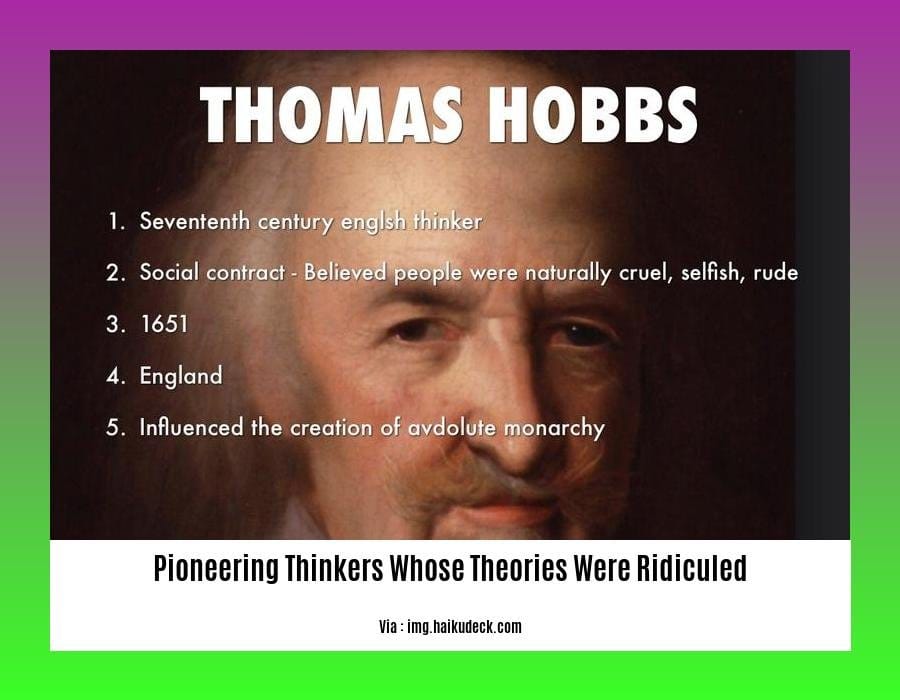Embark on an enthralling journey with “Trailblazing Minds: Pioneering Thinkers Whose Theories Were Ridiculed.” This article unveils the captivating tales of scientific visionaries whose groundbreaking ideas were initially met with skepticism and scorn. Prepare to witness the triumphs and trials of these dauntless individuals whose relentless pursuit of knowledge forever altered the course of human understanding.
Key Takeaways:

- Alfred Wegener: His theory of continental drift was initially mocked but later proved correct.
- Ignaz Semmelweis: His handwashing theory was rejected, but it became a medical standard.
- Aristarchus: His proposal of a heliocentric solar system faced resistance in ancient Greece.
- Gregor Mendel: His genetic inheritance laws were initially ignored, but are now fundamental in biology.
- Nicholas Copernicus: His heliocentric solar system theory faced religious opposition but was eventually accepted.
- Scientists often encounter ridicule when they present new and innovative ideas.
Pioneering Thinkers Whose Theories Were Ridiculed
Ideas that revolutionize our understanding of the world often face initial resistance and mockery. Throughout history, countless pioneering thinkers have challenged established norms with their groundbreaking theories, only to be met with skepticism and ridicule. Yet, their unwavering belief in their ideas ultimately led to paradigm shifts that transformed our understanding of science, medicine, and the very nature of reality.
The Continental Drift Theory:
In the early 20th century, Alfred Wegener proposed his theory of continental drift, suggesting that the continents had once been joined together and were slowly drifting apart. Despite compelling evidence, his ideas were ridiculed by many geologists who clung to the prevailing belief that the continents were fixed in their positions. It wasn’t until decades later, with the advent of plate tectonics, that Wegener’s theory gained acceptance as a cornerstone of modern geology.
The Germ Theory of Disease:
In the mid-19th century, Ignaz Semmelweis revolutionized medical practice by demonstrating that handwashing could prevent the spread of childbed fever. However, his ideas were met with fierce resistance from the medical establishment, who believed that spontaneous generation was the cause of infection. It took years for Semmelweis’s theory to gain acceptance, saving countless lives in the process.
The Heliocentric Solar System:
As far back as ancient Greece, Aristarchus of Samos proposed a heliocentric model of the solar system, with the Earth revolving around the Sun. However, his ideas were overshadowed by the prevailing geocentric model, which placed Earth at the center of the universe. It wasn’t until the time of Copernicus and Galileo that the heliocentric model gained widespread acceptance.
Mendel’s Laws of Inheritance:
Gregor Mendel’s groundbreaking work on pea plants laid the foundation for modern genetics. However, his discoveries were initially ignored by the scientific community, who were skeptical of his statistical approach. It wasn’t until the early 20th century that Mendel’s laws of inheritance were rediscovered and recognized as fundamental principles of biology.
The Ridicule and the Triumph:
The ridicule faced by these pioneering thinkers serves as a reminder that scientific progress is often a slow and contentious process. Despite the skepticism and opposition they encountered, these individuals remained steadfast in their beliefs, ultimately triumphing over adversity to change the course of human knowledge. Their stories inspire us to embrace curiosity, challenge conventional wisdom, and never give up on our pursuit of new ideas.
Delve into the fascinating tales of laughingstocks turned pioneering visionaries, pioneers dismissed as crazy who revolutionized thought, and maverick pioneers whose ideas were initially mocked. Discover how these visionaries triumphed over ridicule to ignite intellectual revolutions.
Pioneering Thinkers Whose Theories Were Ridiculed Essay
Throughout history, groundbreaking ideas often face resistance and ridicule. Pioneering Thinkers Whose Theories Were Ridiculed Essay explores the struggles and eventual triumphs of these brave thinkers who dared to challenge established norms.
From the heliocentric solar system model to the theory of evolution, these pioneers faced skepticism, opposition, and even threats to their lives. Yet, their unwavering determination and rigorous research ultimately led to the acceptance of their groundbreaking theories.
Key Takeaways:
- Alfred Wegener’s Continental Drift theory was initially met with disbelief but later confirmed.
- Ignaz Semmelweis’s advocacy for handwashing in hospitals saved countless lives, despite initial rejection.
- Gregor Mendel’s discovery of genetic inheritance was initially disregarded but later became fundamental in biology.
- Aristarchus proposed the heliocentric solar system in ancient Greece, but his ideas were considered heretical.
- Nicholas Copernicus also proposed the heliocentric solar system, facing opposition from the Church.
Most Relevant URL Source:
Wegener, A. (1912–1915). The origin of continents and oceans. Source: Famous Scientists

FAQ
Q1: What are some examples of scientists whose ideas were ridiculed during their lifetimes?
A1: Examples include Alfred Wegener’s Continental Drift theory, Ignaz Semmelweis’ handwashing theory, and Nicholas Copernicus’ heliocentric solar system theory.
Q2: Why were these scientists’ ideas initially rejected?
A2: They challenged prevailing scientific and religious beliefs, and lacked sufficient evidence to support them at the time.
Q3: How did these scientists persevere despite ridicule?
A3: They remained steadfast in their convictions, continued to conduct research, and eventually presented compelling evidence that convinced the scientific community.
Q4: What impact did the acceptance of these theories have on scientific advancement?
A4: It revolutionized scientific understanding, expanded our knowledge of the world, and paved the way for further discoveries.
Q5: Are there modern examples of scientists whose ideas are met with skepticism?
A5: Yes, many groundbreaking ideas are initially met with resistance, but as evidence accumulates, they are often accepted and become part of our scientific understanding.
















